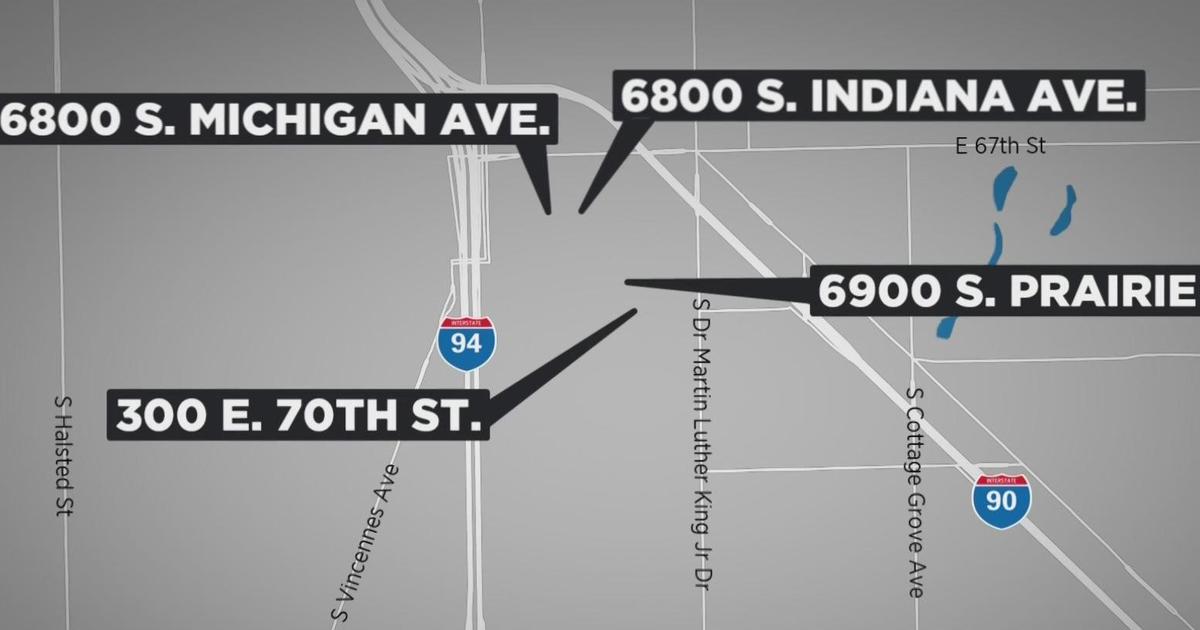Officials Warn Of Great Lakes Water Shortage
TRAVERSE CITY, Mich. (CBS) -- A federal analysis this week warned that the Great Lakes region could experience water shortages in some locations in coming years because of climate shifts or surging demand.
The five-year study by the U.S. Geological Survey, released on Monday, describes the Great Lakes as an aquatic treasure trove. The lakes themselves have 6 quadrillion gallons -- enough to spread a foot-deep layer across North America, South America and Africa -- and the volume of groundwater surpasses that of Lake Huron.
Yet groundwater levels have plummeted about 1,000 feet in the Chicago and Milwaukee metro areas because of pumping for municipal supplies and could drop an additional 100 feet over the next three decades if withdrawal rates jump as expected, the report says. The Milwaukee suburb of Waukesha, its deep wells contaminated with radium, is seeking permission to tap Lake Michigan under a compact signed by the region's eight states in 2005.
The report doesn't identify other potential problem areas, but lead author Howard W. Reeves said local officials should become familiar with data about supplies close to home and use it to guide long-range planning for development and water use.
"The availability of water resources isn't uniform over the whole basin, and things change with time," said Reeves, a USGS hydrologist based in Lansing. "In some areas, there's plenty and a big use wouldn't have a negative impact. In other places that's not the case. We need to be trying to understand those situations, rather than assuming the water will always be available everywhere."
Just 1 percent of the lakes' water is replenished annually through runoff and precipitation, and vast amounts are removed for agriculture, industry, drinking and other uses. Still, the overall supply is so huge that withdrawals have had little effect on the Great Lakes system, the report said.
With a few notable exceptions, urban and suburban development also has not put a serious dent in supplies, although surface water diversions and groundwater pumping have affected some flow patterns over large areas. The 2.1 billion gallons that Chicago diverts from Lake Michigan daily has lowered Lakes Michigan and Huron by about 2.5 inches.
Weather and climate, on the other hand, have significant effects on groundwater and lake levels and stream flow rates, Reeves said. Declining lake levels over much of the past decade resulted largely from drought and warming temperatures that limited winter ice cover and boosted evaporation.
Marc Smith, a policy analyst with the National Wildlife Federation's regional office in Ann Arbor, Mich., said the importance of sound water use should not be underestimated as the Great Lakes states and the Canadian provinces of Ontario and Quebec develop conservation plans and permitting systems for large withdrawals as required under the 2005 compact.
"We live in a very water-rich area and it's easy for folks to look at this vast resource and think there's no way we can deplete it, we don't have to worry about conservation," Smith said. "That would be a terrible mistake."
Congress in 2002 ordered the USGS to develop a nationwide assessment of fresh water supplies and usage amid concern about shortages in the next century. The Great Lakes report is the first step. Methods used in the study will be adapted for analyses in the Colorado, Delaware, and Apalachicola-Chattahoochee-Flint River basins, the agency said.
Chicago Water Service Warnings Go Back Years
Concerns about a future water shortage in the Great Lakes – and in Chicago in particular – are not new. Two years ago, the Chicago Metropolitan Agency for Planning released a study projecting that given the likelihood of a population increase in the coming decades, there may be a water shortage in the area by 2050.
Writer Jessica Pupovic examined the issue in the April issue of the local environmental magazine, "Mindful Metropolis." She writes that one of the problems stems from engineering dating to the 1900 reversal of the Chicago River, which makes it so rainwater doesn't naturally replenish aquifers and the lake, but instead ends up in the city's sewers and through the canal system to the Mississippi River.
Under a 1967 U.S. Supreme Court decree, the state of Illinois is permitted to take no more than 3,200 cubic feet of water per second, or 2.1 billion gallons per day, Pupovic wrote. The loss of stormwater to the city's sewers counts against this limit, because "city residents are essentially depriving regional aquifers and Lake Michigan of the stormwater," she wrote.
The diversion of waste water stormwater to the sewers and ultimately the Mississippi also creates a threat of "interbasin species transfer," such as that of the infamous Asian carp, according to the University of Chicago sustainability office.
To curb the loss of water to storm drains, several groups have suggested replacing downspouts with rain barrels and planting rain gardens, Pupovic wrote. In addition, a pending bill in the Illinois State Senate would expand the permissible uses for "gray water," or collected storm water, which under current state law can only be used to water plants, the article said.
Old infrastructure is also a major contributor to water loss in the area, the article said. The city's old water mains were installed between 1880 and 1930, and the city has been working to replace them for several years. But many of the old pipes remain, and they are "leaking, cracking and, occasionally busting at the seams," Pupovic wrote.
Last year, CMAP issued a series of recommendations for staving off a water shortage. Among them are replacing old toilets with new, high-efficiency models and replacing top-loader clothes washers with money-saving front-loaders. Also suggested are metering water use, auditing water systems for leaks, and forbidding practices that waste water.
Associated Press Environmental Writer John Flesher contributed to this report.
(TM and © Copyright 2011 CBS Radio Inc. and its relevant subsidiaries. CBS Radio and EYE Logo TM and Copyright 2010 CBS Broadcasting Inc. Used under license. All Rights Reserved. This material may not be published, broadcast, rewritten or redistributed. The Associated Press contributed to this report.)



